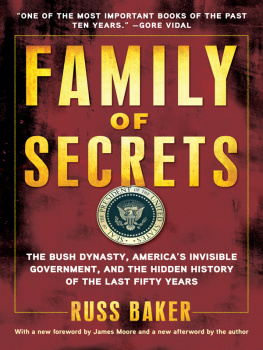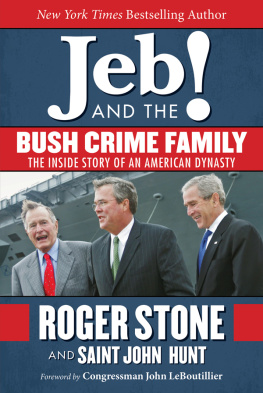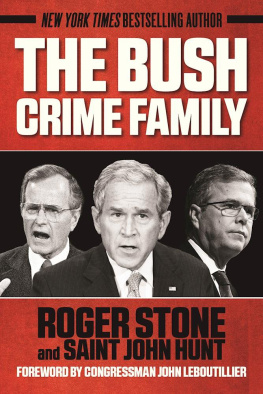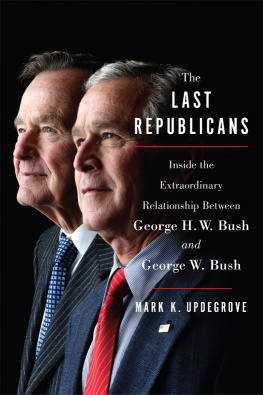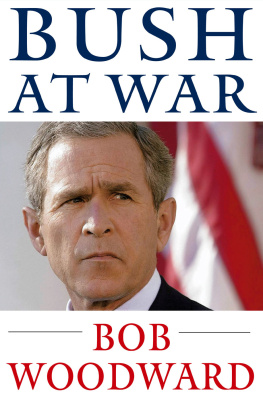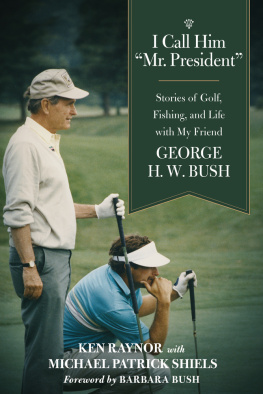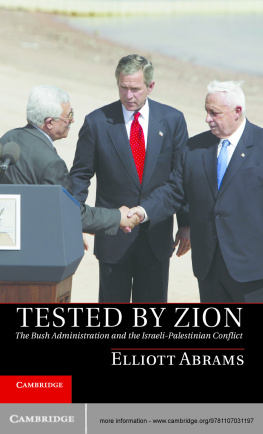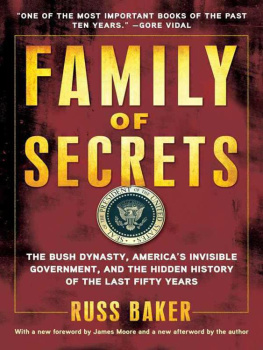FAMILY OF SECRETS

The Bush Dynasty,Americas Invisible Government,and the Hidden History of theLast Fifty Years RUSS BAKER
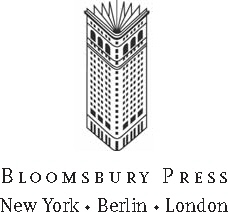
Copyright 2009 by Russ Baker
Foreword copyright 2009 by James Moore
Afterword copyright 2009 by Russ Baker
All rights reserved. No part of this book may be used or reproduced in any manner whatsoever without written permission from the publisher except in the case of brief quotations embodied in critical articles or reviews. For information address
Bloomsbury Press, 175 Fifth Avenue, New York, NY 10010.
Published by Bloomsbury Press, New York
LIBRARY OF CONGRESS CATALOGING-IN-PUBLICATION DATA
Baker, Russ, 1958
Family of secrets : the Bush dynasty, the powerful forces that
put it in the White House, and what their influence means for
America / by Russ Baker.--1st U.S. ed.
p. cm.
Includes bibliographical references
eISBN: 9781608191925
1. Bush family. 2. Bush, George W. (George Walker), 1946-3. Bush, George W. (George Walker), 1946---Friends and associates. 4. Bush, George, 1924-5. Bush, George, 1924--Friends and associates. 6. Presidents--United States--Biography. 7. United States-Politics and government--1945-1989. 8. United States--Politics and government--1989-9. Business and politics--United States. I. Title.
E904.B35 2009
973.931092--dc22
[B]
2008037433
First published by Bloomsbury Press in 2009
This e-book edition published in 2010
E-book ISBN: 978-1-60819-192-5
www.bloomsburypress.com
Contents
When a governor or any state official seeks elective national office, his (or her) reputation and what the country knows about the candidates background is initially determined by the work of local and regional media. Generally, those journalists do a competent job of reporting on the prospects record. In the case of Governor George W. Bush, Texas reporters had written numerous stories about his failed businesses in the oil patch, the dubious land grab and questionable funding behind a new stadium for Bushs baseball team, the Texas Rangers, and his various political contradictions and hypocrisies while serving in Austin.
I was one of those Texas journalists. I spent about a decade trying to find accurate information on Bushs record in the Texas National Guard. My curiosity had been prompted by his failure to adequately answer a question I had asked him as a panelist in a televised debate with Ann Richards during the 1994 gubernatorial campaign. Eventually I published three books on Bush and his political consigliere, Karl Rove. During Bushs presidency, many other volumes, written by insiders and others, would add greatly to the picture of the mans character and policies.
So when Russ Baker first approached me about the book he was planning to write, I admit to being a bit dismissive. W. was concluding his second term, and given the number of capable authors who had scrutinized the president, there seemed little new that might be learned about this famous son of a former president or his family. Every source seemed to have been run to the ground already by his predecessors and there appeared to be no documents left undiscovered. In fact, it was hard not to feel a bit offended by Bakers conviction that I and other reporters might have missed important material or witnesses. A new set of eyes can often recast a story with a fresh perspective, but additional information seemed difficult, if not impossible, to acquire from the collegial Texas political community. Even Texas Democrats had boarded the Bush train, and the extended circle of family and friends were famous for an unwavering loyalty that was unlikely to surrender any news.
Baker, though, was undaunted; he was convinced the full story was untold. He went after the National Guard puzzle with a vigor that I had long since abandoned because I was convinced the Bush team had scrubbed the files in a manner that left little hope for revelation. Baker, however, chased down new witnesses; he dug deeper into the details of Bushs friends in the champagne unit and uncovered close relationships to Saudi financiers that appeared to turn the unlikely into the possible for Bush and his broad protectorate. He found inexplicable money trails in the Permian Basin oil patch of West Texas and followed them wherever they led, which was not too distant from the bin Laden family and various Saudi princes. Baker does a much more comprehensive job of documenting Bushs irresponsible behavior in his youth than did every journalist in Texas that had heard stories of pregnant girlfriends, secret abortions, drunk driving, and walking away from an officers commission in the Texas Air National Guard.
While Family of Secrets records how Bushs lack of youthful accountability informed the Presidents faulty behavior as a leader, it goes far beyond just digging up lost nuggets of information. Baker turns the same unflinching scrutiny on W.s father, the first President Bush, and the evidence that there was also an untold backstory to Bush Seniors ascension. Through witnesses, documents, and analysis, Russ Baker views George H.W. Bushs experiences through an entirely different historical lens, and the data are too compelling to be ignored. In fact, they are quite convincing that we, collectively, missed an entire dimension of the mans life. In the tangle of dark and mysterious relationships that comprise the Bush power structure, Baker has gleaned new meaning in the connections. Baker brings to the table a mass of evidence that the first Bush president was secretly involved in the CIA long before he became the agencys director, and appears to have spent decades developing lucrative financial and political relationships in the United States and abroad, which were foundational to almost every public achievement of the Bush family.
Family of Secrets probes not only the little-known, but the utterly inexplicable. Why, in the hours following the assassination of John F. Kennedy, did George H. W. Bush call investigators to finger a possible suspect who, Bakers research shows, turns out to have been an innocuous fellow actually serving as a minor functionary at the Houston Republican Party offices run by the future president himself? Bush had claimed for years to not be able to recall where he was the day Kennedy was gunned down, but Baker has the record of H. W. Bushs whereabouts and anyone who reads his reconstruction of them will want an accounting less facile than I cant remember. There is no conspiracy theory here, simply information that has been corroborated and never before reported, and it cries out for an explanation.
As damning as Bakers work is for the Bush family, it is also revelatory regarding our nations government. The disturbing reality revealed in fine detail here is that there are unseen forces at work on every presidency, and their interests are rarely, if ever, the same as those of the electorate. Defense contractors, multi-national energy corporations, pharmaceutical giants, Wall Street princes indeed virtually all businesses that can afford to hire a lobbyistare constantly engaged in trying to shape a policy that improves their bottom lines and gets the president to over-value their perspectives.
Evidence that their power has not waned is manifest in many of the Bush policies that remain unchanged in the administration of President Barack Obama. The new president has continued to funnel money into the bailout of megalithic financial services firms even as their former executives become members of his cabinet and guide his policies. The Obama White House is also investing American taxpayer funds in auto manufacturing firms that the market appears to have already decided no longer have a viable product. Warrantless surveillance, which he condemned on the campaign trail, lingers and risks infecting the integrity of every other promise made by the current president. If you wonder why the Change president has so far made relatively few substantive structural changes,

